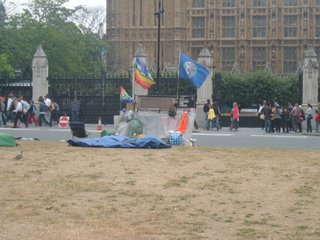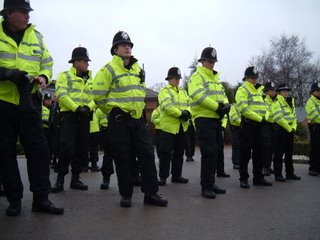"free liberties and free customs"

posted by k
When I was young, I went to look at parliament and Downing Street. Both were protected by police but there was no problem in getting close. I remember standing with a small group of tourists to gaze at the door of Number 10. The policeman standing beside the door greeted all-comers with a friendly smile.
You can't get close to Number 10 now. You can't enter Downing Street. There are gates and armed police. The armed police officers are friendly and used to dealing with tourists but the weapons are very big and automatic. The message is clear: keep away from the government.
Embarrassing the govervnment is rapidly becoming a crime. The small encampment Brian Haw established on a traffic island opposite the Houses of Parliament became one of the subjects of a hastily drafted law, the Serious Organised Crime and Police Act. The aim was to remove Brian Haw. It failed. The diminished encampment still stands.

No-one else is allowed to demonstrate near parliament. It's now against the law for an individual to carry a banner in a "designated area" or to read out the names of the dead.
Little liberties we took for granted are being taken away while we barely notice. We're growing accustomed to surveillance, whether it's by CCTV cameras, by our neighbours or through the immense databases that store personal information - and divulge it to a range of clients, including the government. Even though studies warn that the databases are faulty and the information seriously flawed, the government mania to spy on the people grows.
Policing is heavier than I've ever known it. Detention of protestors has become routine, whether it's surrounding a few individuals, hustling a heckler away from a meeting or kidnapping coachloads of pacifists to prevent them expressing their views. All the time the police film those of whom they disapprove.
The police wield cameras like guns.
 They obscure the friendly faces and threaten those filmed.
They obscure the friendly faces and threaten those filmed.No-one says why peaceful demonstrators are being filmed nor what will happen to the records. Demonstrators take the process for granted and don't ask. Most demonstrators accept temporary detention as a hazard that befalls those opposing the government. It's only when someone unused to such conventions is caught up, filmed and detained that anyone realises how strange it is.
Government is being kept from the people who are governed.
In a democracy, citizens debate, protest, argue, talk and explore what government should do. Thought is vital. Questioning is a means by which government is tested. Lively disagreement can lead to new ideas and progress.
Now there's a new attempt to protect personal liberty. A campaign, "Future Britain", is calling for a new Bill of Rights. Several organisations are involved, including The London School of Economics, Charter 88 and Liberty. The Conservative Party and Liberal Democrats are involved as well. This makes me hesitate. I've never voted Conservative. These days political parties can prefer marketing to thought and debate. But first signs are good. There's a call for public discussion.
It's easy to see the dangers. Recent laws granting rights have excluded some individuals. Children seeking asylum seekers and the children of asylum seekers have less protection than other children in this country, and can be detained for long periods even though they have committed no crime. A Bill of Rights must protect us all: criminals and victims, strong and vulnerable, powerful and powerless.
And the state has to be persuaded to impose limits on its power.



